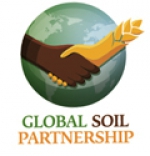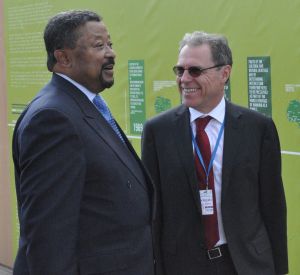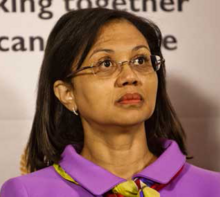11 Mars 2013. Dakar. Une approche novatrice de financement de l'ARD est
le financement de la recherche par les acteurs de la chaîne de valeur.
Certaines structures naissent qui offrent des possibilités de financement aux structures de vulgarisation, d’appui-conseil ou a la recherche. Les exemples sont le
FIRCA en Côte d’Ivoire, le (FNRAA) au Sénégal, le
FONRID au Burkina Faso (voir e.a. p.22:
Analyse des mécanismes de diffusion des technologies agricoles améliorées et innovations dans l'espace CEDEAO)
Certains pays ont réussi à mettre en place des structures servant de plateformes opérationnelles d’utilisation des résultats de recherche par les producteurs et ont pris une option sérieuse de résolution du problème de financement du système:
- Le Fond Interprofessionnelle de la Recherche et du Conseil Agricole (FIRCA) en Côte d’Ivoire permet le financement endogène de la recherche agricole par le privé à travers les cotisations des différentes filières
- Le Fonds National de Recherches Agricoles et Agro-alimentaires (FNRAA) au Sénégal permet par un systeme de fonds compétitifs une recherche ciblant les besoins réels des producteurs. Dans le cadre du projet PAEPARD, le CSA a chargé l’IPAR et le CNCR de réaliser une étude sur le FNRAA. Le FNRAA est un mécanisme public de financement de la recherche agricole innovant puisqu’il implique directement les organisations paysannes, via le CNCR, dans ses instances de décision et d’évaluation. Par-là, il permet une orientation de la recherche vers les demandes exprimées par les producteurs.
- Au Burkina Faso, des crédits importants ont été contractés auprès de la Banque Mondiale au profit des recherches agricoles, par une nouvelle structure: le Fonds National de la Recherche et de l'Innovation pour le Développement (FONRID).
Lors d'un atelier PAEPARD à Dakar, deux exemples ont été présentés.
- En Côte-d'Ivoire 18 chaînes de valeur travaillent avec le Fond Interprofessionnelle de la Recherche et du Conseil Agricole (FIRCA) et 13 à 14 font la perception des taxes. Les acteurs de la filière identifient les projets que le FIRCA finances. Les projets sont la recherche appliquée, le conseil agricole, la formation technique et le renforcement des capacités.
- Au Burkina Faso, le Ministère de la Recherche Scientifique et de l'Innovation a créé en Janvier 2011 le Fonds National de la Recherche et de l'Innovation pour le Développement (FONRID). Dans le souci d’affirmer sa souveraineté dans le domaine de la recherche scientifique et de l’innovation, l’Etat Burkinabè a pris les options ci-après: (a) l’orientation de la recherche vers la demande et les priorités nationales ; (b) l’amélioration de la qualité de la recherche scientifique ; (c) la promotion de l’invention et de l’innovation ; (d) la diversification du partenariat scientifique, technique et financier.
Ci-dessous suivent deux interviews sur ces mechanismes nationaux de financement de la RAD (Recherche en Agriculture pour le Developpement):
- Interview avec Adolphe OUYA, Fond Interprofessionnelle de la Recherche et du Conseil Agricole (FIRCA) - Cote d’Ivoire.
- Interview avec Denis Depommier, Directeur Regional du CIRAD pour l'Afrique de l'Ouest Cotiere.
Interview avec Adolphe OUYA, Fond Interprofessionnelle de la Recherche et du Conseil Agricole (FIRCA) - Cote d’Ivoire.
Comment est-ce que le thème de recherche des acteurs de la filière est sélectionné par la FIRCA?
Evidemment nos thèmes de recherché sont identifiés par des ateliers avec les tous acteurs de la filière, pas seulement les producteurs. Nous identifions alors les projets que nous allons exécuter sur une période de trois années. Au niveau du plan d’action du FIRCA nous évaluons chaque année les projets.
Comment est-ce que la filière peut-elle financer la recherche?
FIRCA en Côte d’Ivoire – par exemple - négocie avec les acteurs de la filière mangue la cotisation de la filiere. Apres concertation nous nous sommes mis d’accord sur une cotisation de 2,5 CFA par kg de mangue exportée. Avec cette cotisation nous finançons le fond de recherche, de la formation technique, du renforcement des capacités et du conseil agricole. Evidement ces projets sont arretes par une consultation entre la FIRCA et les acteurs de la filière. La filière identifie les projets qui seront finances a travers la FIRCA. Les projets sont la recherche appliquée, le conseil agricole, la formation technique, et le renforcement des capacités
La FIRCA fait une mise a jour tous les trois mois et c’est la filière qui avec ses propres ressources qui finance les projets, evidement avec le soutien de l’Etat Ivoirien.
Combien de filières ont suivi cette approche?
18 filières travaillent avec la FIRCA et 13 a 14 filières récoltent des contributions : hévéa , l’huile de palme, café, cacao, la filière cochon, la filière avicole, la filière fruit-agrume, et d’autres filières ont intégré ce système pour financer de la recherche.
Est-ce qu’une recherche résidu de mangue peut-elle être finance par le FIRCA ?
Oui, évidemment puisque c’est un souci et un besoin des acteurs de la filière, a la fois en Côte d’Ivoire, au Burkina Faso au Sénégal et au Mali. Nous avons les mêmes problèmes dans notre filière. Et si nous identifions un thème spécifique, il est certain que c’est également un souci pour la Côte d’Ivoire.
En Côte d’Ivoire nous allons déjà étudier comment nous pouvons démarrer le projet en tenant compte des financements disponibles. Ce qui serait intéressant est également avoir un bailleur qui est prêt a investir et de collaborer afin de mettre le projet en opération.
Quelle est l’origine du financement de la recherche par la filière ?
En Côte d’Ivoire nous nous sommes rendus compte que beaucoup de projets étaient financés et que les résultats étaient parfois déplorant. Parfois la raison était que le meme projet était finance : ou bien par le bailleur ou par l’Etat. Il était donc necessaire de federer toutes ces energies dans une structure centrale.
Est-ce que cela n’est pas le scenario idéal pour financer la recherché menee par les utilisateurs de la recherche?
Je crois en effet que ceci serait le scenario idéal. Parce-que vous connaissez le mieux ce que sont vos besoins. Vous orientez la recherche selon vos intérêts. Je ne dis pas que les bailleurs imposent leurs volonté, mais vous avez la capacité d’aller dans la direction que vous désirez. Il est par consequent important que les gouvernements africains mobilisent leurs ressources et demandent ensuite un complément des bailleurs qui sont prêts a les accompagner afin de réaliser le projet.
Interview avec Denis Depommier, Directeur Regional du CIRAD Afrique de l'Ouest Cotiere.
Atelier multi-acteurs PAEPARD/ColeACP - La valorisation non alimentaire des dérivés de la mangue en Afrique de l’Ouest. Dakar du 11 au 14 mars 2013.
Denis Depommier reponds aux questions suivantes:
- Quels fonds faut-il exploiter pour la recherche sur valorisation non-alimentaire de la mangue?
- Quelle est la collaboration du CIRAD avec la FIRCA?
- Quel est le Fond complementaire Australien au CORAF?




































